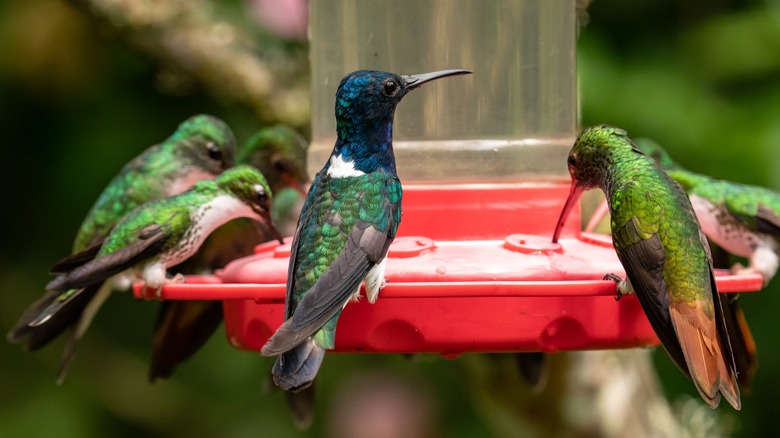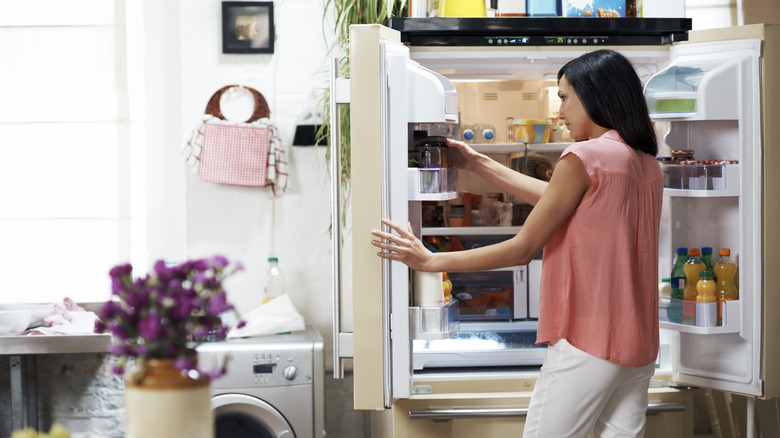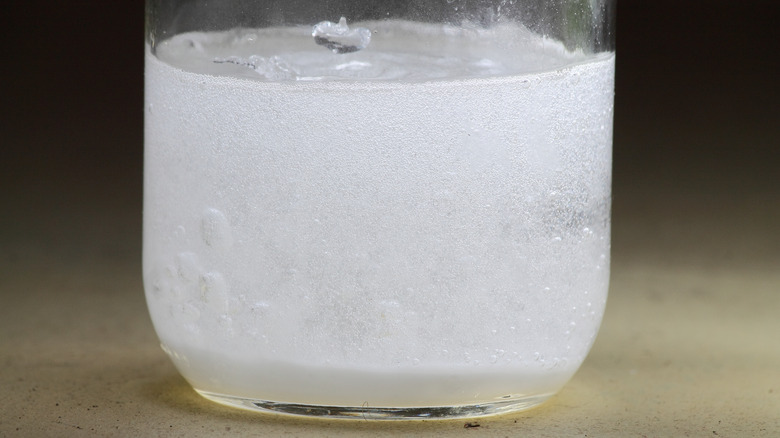The Best Way To Store Extra Hummingbird Nectar (And How Long It Stays Good For)
We may receive a commission on purchases made from links.
The first hummingbird feeder was purportedly made by Massachusetts enthusiast Caroline Soule over a century ago, according to the Georgia Wildlife Resources Division. She fed her hummingbirds sugar water just as so many 21st-century backyard bird enthusiasts do. Today, we know that homemade nectar should be stored in the fridge, where it will stay fresh for up to a week. How Soule kept her nectar fresh pre-refrigeration, we'll never know! We also have access to pre-made nectar in ready-to-use, concentrate, and powder form, for which storage times and recommendations vary according to the manufacturer.
Why does keeping hummingbird nectar fresh even matter? One reason is that spoiled nectar may be why hummingbirds are steering clear of your yard. When sugar water is exposed to high temperatures, the sugars begin to ferment, transforming into alcohol. If the hummingbirds drink this potent mixture, they get drunk. As you can probably imagine, a drunk hummingbird is clumsy – they hurt themselves by banging into things and they're more vulnerable to attack. Bacteria and fungus may start to grow on improperly stored or room-temperature nectar. Just as humans succumb to food poisoning, birds that consume this contaminated nectar may fall ill or even die.
Recommendations by nectar type
Homemade hummingbird nectar or sugar water tends to have the shortest shelf life since the only preserving agent is the sugar it contains. If you make a batch that's too big to use in one day, you'll need to store it in the refrigerator, which slows fermentation and contamination. Put the mixture into a clean container or bottle with an airtight seal, and place it on the lowest shelf in the fridge, where it's coldest. If you've really made a lot, you can freeze homemade nectar for up to a month. Either way, bring it to room temperature before offering it to any feathered visitors.
What about store-bought nectar? You can purchase it in various products from ready-to-use nectar and nectar concentrate in liquid or powder form. In most cases, you'll need to consult the manufacturer's directions and best-by dates to determine where and how long to store these commercial nectars. As a general rule, treat ready-to-use nectar as you would fresh, homemade nectar. Store concentrated nectar in an airtight container in a cool, dark, dry spot like your pantry. Powdered nectar is the longest lasting — up to 6 months if stored correctly.
When to discard nectar
Happy Hummers Ready-To-Use Hummingbird Nectar by EZNectar is around $25 on Amazon and needs to be refrigerated after opening. Perky-Pet has a 64-ounce bottle of Liquid Hummingbird Nectar Concentrate for just over $20, and the label says no refrigeration is required. The 8-ounce bag of clear powdered humming nectar concentrate by More Birds from Menards can be stored anywhere so long as it's in a sealed bag or container. Avoid products with red dye — though the claims are unproven, certain studies suggest that it can be harmful to birds.
Other best practices for keeping your nectar safe from spoilage include avoiding products with preservatives and additives (they may be bad for bird health), sticking to a sufficient water-to-sugar ratio, and boiling the water if you live in an area with poor quality. Refined sugar is the only sugar you should be using in your DIY hummingbird nectar — no honey, maple syrup, brown sugar, or molasses. Useable nectar looks like clean water. If you notice your fridge or pantry-stored nectar has turned cloudy, smells off, or you can see mold growing on the surface, discard it.


